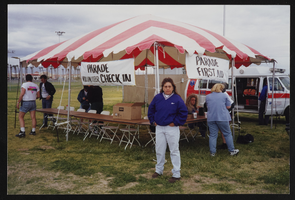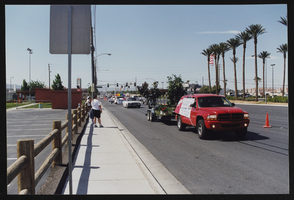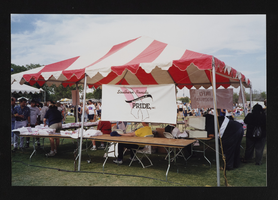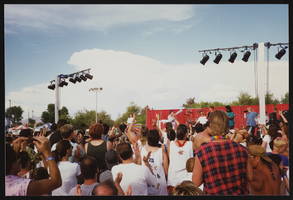Search the Special Collections and Archives Portal
Search Results
Carolyn Whaley oral history interview
Identifier
Abstract
Oral history interview with Carolyn Whaley conducted by Diana Rhodes on March 22, 2005 for the UNLV Women's Studies Veteran Oral History Project. Whaley discusses her early interest in music and her successful audition for the United States Air Force Women's Air Force (WAF) Band in 1959. She explains that the band was the only all-female band in the military between 1951 and 1961, and shared a number of stories about the function and activities of the band. Later, she discusses her civilian career as a music teacher in Barstow, California and decision to move to Las Vegas, Nevada after her retirement in 2000. She also remarks on the lack of interest that officials at Nellis Air Force Base in Las Vegas showed in veterans.
Archival Collection
Andy Hafen oral history interview
Identifier
Abstract
Oral history interview with Andy Hafen conducted by Stefani Evans and Claytee D. White on August 22, 2016 for the Building Las Vegas Oral History Project. In this interview, Hafen discusses his upbringing in Henderson, Nevada. He recalls being elected to the City Council in 1987, the expansion of Henderson, and the development of the Water Street District. Hafen then talks about redevelopment of historic areas and the increase in businesses in Henderson. Later, Hafen discusses Lake Las Vegas, the drought and its effect on Lake Mead, and the challenges in developing Lake Las Vegas. Lastly, Hafen explains the how Nevada State College (NSC) has become the necessary link between the College of Southern Nevada (CSN) and the University of Nevada, Las Vegas (UNLV).
Archival Collection
Bill Lamb oral history interview
Identifier
Abstract
Oral history interview with Bill Lamb conducted by Roger Barnhart on June 29, 1975 for the Ralph Roske Oral History Project on Early Las Vegas. Lamb was born in August 22, 1943 in Henderson, Nevada. In the interview, he talks about his experiences moving around Northern Nevada due to his father's mining job. Lamb also discusses his education, family, military service, work in Las Vegas, Nevada casinos, and the Church of Jesus Christ of Latter-day Saints.
Archival Collection
Jessica Guiao oral history interview
Identifier
Abstract
Oral history interview with Jessica Guiao conducted by Grecia Lopez on November 22, 2022 for the Reflections: the Las Vegas Asian American and Pacific Islander Oral History Project. In this interview, Guiao recalls her childhood in Hayward, California, and being raised in Las Vegas, Nevada. She recalls not liking the climate of Nevada at first, and describes the friends she has made throughout her time in the city and the identity she has developed. Guiao discusses some of the pressures and stereotypes surrounding Asian Americans, such as what career path they should pursue or the aversion to embracing subcultures, and how she has consolidated her rebellion into her own identity. Throughout the interview, Guiao touches on other topics such as Filipino food, the long-standing history between Mexican and Filipino communities, Catholicism, goth culture, and anti-Asian hate and racism that she and her family has faced.
Archival Collection

Second annual Gay Pride Parade check-in, image 002: photographic print
Date
Archival Collection
Description
Image

Flex nightclub float in the third annual Gay Pride parade: photographic print
Date
Archival Collection
Description
Image

Southern Nevada Association of Pride, Inc. booth at Gay Pride: photographic print
Date
Archival Collection
Description
Image
Joel Coombs oral history interview
Identifier
Abstract
Oral history interview with Joel Coombs conducted by Claytee White on February 22, 2014 for the African Americans in Las Vegas: a Collaborative Oral History Project. In this interview Joel Coombs spoke about how his peers reacted to his interracial family. He recalls attending Valley High School amidst racial tensions, racism, and prejudice. He also spoke about the drug abuse happening at Valley High School and Bishop Gorman High School in Nevada. He recalled participating in protests as a child and landing on the front page of The Post.
Archival Collection
Maxine Butler oral history interview
Identifier
Abstract
Oral history interview with Maxine Butler conducted by Frank Johnson on April 22, 2016 for the African Americans in Las Vegas: a Collaborative Oral History Project. In this interview, Butler discusses her early life in Jonesboro, Louisiana. She talks about moving to Las Vegas, Nevada in 1965, the Westside, and businesses on Jackson Street. Butler recalls working at The Cove as a cocktail waitress, the reopening of Moulin Rouge Hotel, and the African American community on the Westside. Later, Butler discusses her involvement at Greater Evergreen Missionary Baptist Church, the importance of church to the African American community, and compares church life in Jonesboro and Las Vegas. Lastly, Butler talks about changes in the Westside.
Archival Collection

Crowd watching Cyndi Lauper perform at Gay Pride, image 001: photographic print
Date
Archival Collection
Description
Image
